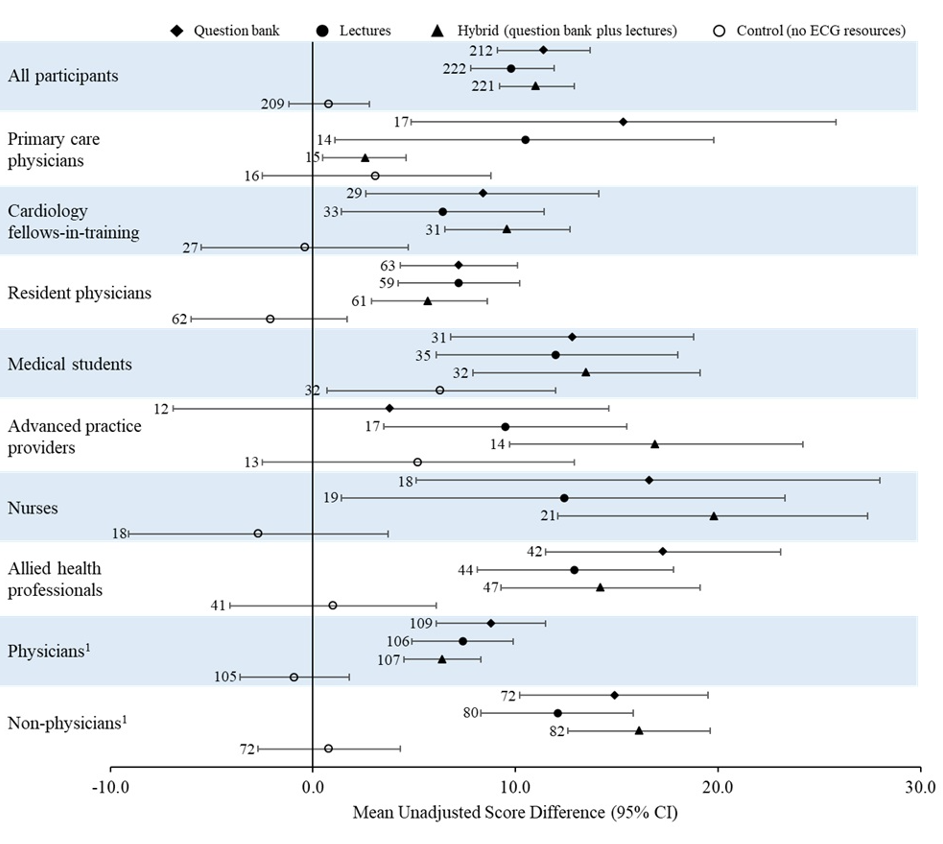Introduction: Despite the critical role of electrocardiograms (ECGs) in patient care, evident gaps exist in ECG interpretation competency among healthcare professionals across various medical disciplines and training levels. Currently, no practical, evidence-based, and easily accessible ECG learning solution is available for healthcare professionals. The aim of this study was to assess the effectiveness of web-based, learner-directed interventions in improving ECG interpretation skills in a diverse group of healthcare professionals.
Methods: In an international, prospective, randomized controlled trial, 1206 healthcare professionals from various disciplines and training levels were enrolled. They underwent a pre-intervention test featuring 30 12-lead ECGs with common urgent and non-urgent findings. Participants were randomly assigned to four groups: (i) practice ECG interpretation question bank (question bank), (ii) lecture-based learning resource (lectures), (iii) hybrid question- and lecture-based learning resource (hybrid), or (iv) no ECG learning resources (control). After four months, a post-intervention test was administered. The primary outcome was the overall change in ECG interpretation performance, with secondary outcomes including changes in interpretation time, self-reported confidence, and accuracy for specific ECG findings. Both unadjusted and adjusted scores were used for performance assessment.
Results: Among 1206 participants, 863 (72 %) completed the trial. Following the intervention, the question bank, lectures, and hybrid intervention groups each exhibited significant improvements, with average unadjusted score increases of 11.4 % (95 % CI, 9.1 to 13.7; P<0.01), 9.8 % (95 % CI, 7.8 to 11.9; P<0.01), and 11.0 % (95 % CI, 9.2 to 12.9; P<0.01), respectively. In contrast, the control group demonstrated a non-significant improvement of 0.8 % (95 % CI, -1.2 to 2.8; P=0.54). While no differences were observed among intervention groups, all outperformed the control group significantly (P<0.01). Intervention groups also excelled in adjusted scores, confidence, and proficiency for specific ECG findings.
Conclusions: Web-based, self-directed interventions markedly enhanced ECG interpretation skills across a diverse range of healthcare professionals, providing an accessible and evidence-based solution.
Reference: Kashou AH, Noseworthy PA, Beckman TJ, Anavekar NS, Cullen MW, Angstman KB, Sandefur BJ, Shapiro BP, Wiley BW, Kates AM, Sadhu J, Thakker P, Huneycutt D, Braisted A, Smith SW, Baranchuk A, Grauer K, O'Brien K, Kaul V, Gambhir HS, Knohl SJ, Restrepo D, May AM. EDUCATE: An international, randomized controlled trial for teaching electrocardiography. Curr Probl Cardiol. 2024 Jan 15;49(3):102409. doi: 10.1016/j.cpcardiol.2024.102409. Epub ahead of print. PMID: 38232918.



 عربى
عربى  中国人
中国人  Dansk
Dansk  Suomalainen
Suomalainen  Français
Français  Deutsch
Deutsch  Ελληνικά
Ελληνικά  हिन्दी
हिन्दी  Bahasa Indonesia
Bahasa Indonesia  Italiano
Italiano  日本
日本  Melayu
Melayu  Norsk
Norsk  Português
Português  Русский
Русский  Español Europeo
Español Europeo  Español
Español  Svenska
Svenska